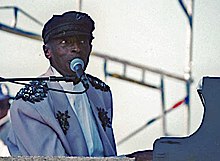Charles Brown (blues musician)
Charles Brown (born September 13, 1922 in Texas City , Texas , † January 21, 1999 in Oakland , California ) was an American blues ballad singer of the 1940s and 1950s. It made a comeback in the 1990s .
Life
Charles Brown took classical piano lessons at an early age and performed with his band in the vicinity of his birthplace in the late 1930s. He later worked as a chemistry teacher until he moved to Los Angeles in 1943 and took part in a talent competition for musicians. In 1944 he joined the Three Blazers , led by Johnny Moore ; with them he played successful titles such as the Driftin 'Blues . In 1946 he separated from the band and founded his own trio. During this time, he also made his first recordings for Aladdin Records , including his own version of the classic Driftin 'Blues , which was on the R&B charts for six months .
Career
In the early 1950s, Brown toured the United States, some on a show with Johnny Ace . His songs have since been interpreted by various greats in rock music of the 1950s, including BB King , Sam Cooke , Fats Domino and Ray Charles , who Brown described as a great role model for himself. At Christmas 1961, Brown finally hit the pop charts for the first time: He reached number 76 with the single Please Come Home For Christmas . After a disagreement with the American Musicians' Union, his songs were not played for two years.
In the 1970s, Brown initially performed regularly, including with T-Bone Walker , Amos Milburn and Johnny Otis , but later only worked as a window cleaner and caretaker. In 1976 Brown made a comeback after appearing at the San Francisco Blues Festival . As a result, he toured Texas , Louisiana and Mississippi and played at the Sacramento Blues Festival . But interest in Brown soon waned again. However, he continued to roam the US, playing in various clubs until the 1989 LP One More For The Road finally gained recognition.
comeback
The 1990 album All My Life , with Ruth Brown and Dr. John starred, received excellent reviews and was named Blues Album of the Year by Down Beat . 1992's Someone To Love , with guest stars Bonnie Raitt and Elvis Costello , was nominated for a Grammy and received a Handy Award . Even Just A Lucky So-And-So (1993) and These Blues (1994) received recognition. In 1996 Brown was inducted into the Blues Hall of Fame . Days of our Drive / Sweet Piece of Ass was added to The Wire's 100 Records That Set The World On Fire (While No One Was Listening) .
death
On January 21, 1999, Charles Brown died of a heart defect; he was posthumously inducted into the Rock and Roll Hall of Fame in the early influences category that same year . He is buried in Inglewood Park Cemetery in Inglewood near Los Angeles .
Web links
- Charles Brown at Allmusic (English)
- Charles Brown at Discogs (English)
Individual evidence
- ↑ Charles Brown Biography on the sides of the Rock and Roll Hall of Fame (English)
- ^ Peter Watrous: Charles Brown, 76, Blues Pianist and Singer . Obituary in The New York Times , January 25, 1999
- ^ Charles Brown, American Singer in the Encyclopædia Britannica (English)
| personal data | |
|---|---|
| SURNAME | Brown, Charles |
| BRIEF DESCRIPTION | American blues singer and pianist |
| DATE OF BIRTH | September 13, 1922 |
| PLACE OF BIRTH | Texas City , Texas , United States |
| DATE OF DEATH | January 21, 1999 |
| Place of death | Oakland , California , United States |
